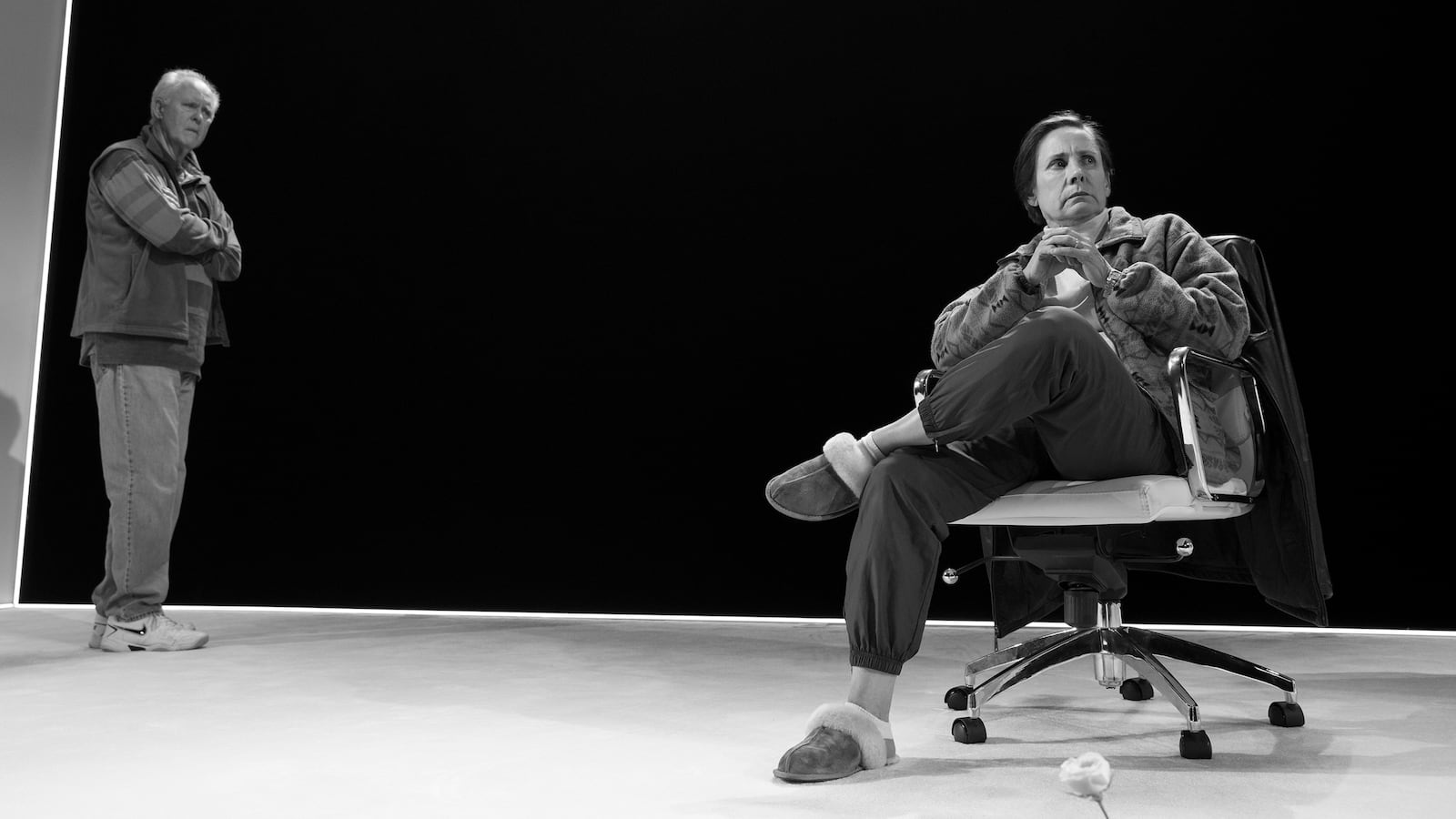Hillary Clinton is a familiar Broadway visitor; the show doesn't go on until the crowd stops applauding her. But one would imagine a trip to the Golden Theatre this spring might be a little too meta for comfort.
Laurie Metcalf and playwright Lucas Hnath have returned to the Golden Theatre, after the Tony-winning success of A Doll’s House, Part 2, in 2017. And here again, on the relatively blank canvas of Chloe Lamford’s set, Metcalf is playing a woman at a crossroads, trying to forge a victorious path away from male obstruction and the baleful judgement of those around her.
In Hillary and Clinton (booking through July 21), Metcalf is playing Hillary Clinton, at a key moment during her 2008 duel with Barack Obama (Peter Francis James). The New Hampshire primary is about to happen. She's in a hotel room. Her campaign has stalled, what should she do? Accept Obama’s offer and give up her campaign, and join him as his running mate? Fight on? Have Bill Clinton (John Lithgow), her husband, the crutch she does not want but may well need, come and join her campaign? Her adviser Mark Penn (Zak Orth) wants her to fight on, but without Bill.
The play is as zippy as A Doll’s House, Part 2, but whereas that felt new, fresh, and subversive, Hillary and Clinton feels like very old and well-trodden ground, a mash-up of every single argument you’ve ever heard (with very little new insight) in favor and against Hillary Clinton.
Further air is deflated from its tires from the simple slice of knowledge that we know what happened next, and we know what happened after that and after that and after that. We are watching another raking over of extremely old coals in a life that has been endlessly chronicled and analyzed; this pre-Trump battle royale slice of Hillary history feels like a distant curio.
Metcalf plays Hillary with an impressive, defiant lack of Clinton affectation. Instead, in private she and director Joe Mantello imagine a candidate of equal parts exasperation and careworn determination. She wears an old patterned jacket and trackpants; in the hotel room, she paces, she challenges, she interrogates, she won't let go.
This is no drag act or cod-impersonation; Metcalf and Lithgow are playing characters called Hillary and Bill. Mark Penn (Zak Orth) is ‘Mark,’ and Peter Francis James is ‘Barack.’ There are no wigs or pant suits, or tried-on voices.
In his notes for the play, Hnath says: “Do not play for easy recognition. Don’t imitate. Don’t even try to cast actors who look like these people. Instead, imagine that the audience watching this play has never heard of the Clintons or Obama and that this is an opportunity to create these characters anew.”
All the actors do as instructed; Metcalf’s Hillary is a candidate of many weathers, which Metcalf skillfully commandeers: variously intelligent, morose, angry, despairing, determined, and resigned. But the play also feels as airless as the hotel room we are in; it cannot tell us anything new, so what can it make up and still maintain its marriage to reality?
Performers “interpreting those roles must invent the sound of the characters, the look of the characters, the physical movement of the characters, and they must base their interpretations entirely on the text and its dramatic requirements,” writes Hnath.
“Treat this play in the same way. Play the text and not the persona that exists outside of the text so that you may elevate these characters beyond a facile tabloid reality.”
The company follows his set of instructions to the rule, but it’s intriguing for Hnath to scorn “facile tabloid reality” when this play, on one level at least, is a piece of gleefully imagined voyeurism. It does not interrogate Hillary Clinton’s policies, it focuses almost entirely on the nature of her marriage to Bill and her failures and strengths as a human being. It is very personal. It is all about her as person, not her manifesto. Hillary and Clinton may be on stage, but it has a distinctly tabloid instinct itself.
The hotel room is really four white walls, not padded but resembling its own psychiatric holding facility. There is a swivel chair and mini-bar in it; throughout the 90 minutes of the play clothes, cans, and wrappers fall to the floor.
The character called Hillary is also a narrator of a kind, taking us into the room after first contemplating “the infinite number of planet earths” out there in space. In the hotel room, candidate Hillary considers how abysmally she is doing, just days before the New Hampshire primary; Metcalf evoking both the seasoned player and aggrieved victim of voter spurning. This Hillary knows she would be a good president; just what is people’s problem with her.
Mark will do all he can to help her except ask Bill Clinton to join the campaign. A neat little directing tweak occurs in the next split second: the sight of Bill’s head; he’s come to join his wife on her request.
Lithgow’s Bill is a withdrawn schlub, a seen-it done-it languid ex-president of leisure. He has, in no particular order: stomach pains, concerns he has been cursed by a witch doctor, is upset he was banished by his wife, and puzzled as to why she wants to see him.
Another lovely moment happens when they go to hug, and touch foreheads, then awkwardly maneuver into a hug that actually becomes what the best hug should be: loving, and a salve.
But this amity doesn’t last. She notes his selfishness, how everything is about him (as he kvetches that Obama has copied his ideas). She was there for him, now he should be at her beck and call. He notes her apparent coldness, and that people “vote on emotion,” which she scorns. “You’re better than everyone, and you act like it all the time, and it makes people feel like shit,” he tells her.
All her life, people have been judging her emotional response to things, including his sexual indiscretions, as appropriate or not, a weary Hillary notes. She can do no right. She wakes some mornings to whatever new controversy there is and wonders if a twin Hillary has been up at night undoing all her good work.
Hnaf imagines Hillary rationalizing people’s dislike of her as because they believe she stayed with Bill because she wanted a career in politics herself. The theory is left hanging.
Act Two begins with a snap of Metcalf’s fingers; no usual stage segues here. It’s two days later. Some more ripped-from-the-headlines zingers fly. Bill tells Mark no one will remember what a lobbyist did; Mark tells Bill when they remember Clinton, they’ll remember him for his sex scandals.
By now, Hillary has been deemed to have shown ‘natural’ emotion—tears—at a public event, and Lithgow as Bill is in a pair of reveal-nearly-everything running shorts. She has won New Hampshire, but the power she feels is a self-deluded illusion, which becomes immediately clear in her meeting with Obama, where she tries and fails to flex her political muscles.
Hnath imagines Obama having dynamite information on Bill Clinton's charity finances as his own ace.
The play ends as it began with an observation of the universe, and the possibilities of that universe offering, in one configuration somewhere else out there, the chance of victory as well as many other outcomes.
This copout ending may be one for the still-grieving Hillary voters. However, Hillary and Clinton is ultimately a play about the minting of a loser. It doesn’t prize one theory above another in its analysis of Hillary Clinton. Was her political loss in 2008 her fault for not seeing herself in relation to the voters? Or the voters' fault for not seeing Clinton for all she was?
Metcalf shows a person who knows her capabilities and strengths, who feels she has not been able to fully show them in the public realm, and who feels she is being prevented from using them in the office she feels so well suited for. This restrained play may not tell us anything new, but it imagines a moment of personal history sympathetically. It is more frustrated lament than mischievous post-game analysis.
Socrates
Tim Blake Nelson’s play Socrates, running at the Public Theater to May 26, is extremely long, and feels extremely long. It is, proudly and unapologetically, a play of ideas; so if you want a long bath in those, buy a ticket. It is ideas’ night, my friends, a philosophy-palooza. On a very spare stage, a mainly male cast evoke the life of the great philosopher, whose struggle to speak what moral truths he believed to be true cost him his life.
The political forces that seek to silence him have markedly Trumpian-era echoes; references to corrupt leaderships of Ancient Greece bought many groans of recognition at the performance this critic saw.
Thank goodness in this arid, almost three-hour brainbox-joust, Michael Stuhlbarg is in the title role. He gives human shape to all the intellectual huff-puffery, and some emotional scaffolding to the weighty thinkiness of the play. His fury is both a roar and also precise.
Teagle F. Bougere plays a very gentle Plato, narrating events to Niall Cunningham's ‘Boy,’ who does a phenomenal job of looking very interested. Other actors play characters and rulers Socrates either counts as acolytes or enemies. He treats both sets of people almost the same—as saps who wither under his fierce, and always right, moral argument. And this a play of arguments, rather than character.
Miriam A. Hyman's as Xanthippe, Socrates' wife, was apparently the only person when Socrates was alive to challenge him to behave like an ordinary human for the sake of his family. Socrates declines to do so. (In this play she also appears to be the only woman in Ancient Greece.) By the end of this epically long intellectual pummeling, conducted in dusky half-light, the time comes for Socrates to drink his hemlock—and then one of the most painful-looking death scenes on the New York stage this spring.







